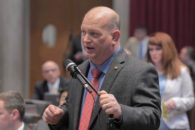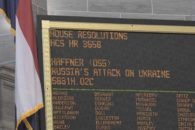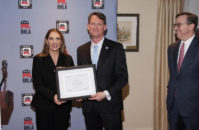Missouri’s Public Service Commission (PSC) ordered Spire Missouri to draft a new letter regarding the possibility of the shutdown of its STL Pipeline amid controversy over its communication to customers.
Spire’s outreach has been the subject of controversy over the past few weeks.
The Environmental Defense Fund (EDF) — which filed the lawsuit that led to the pipeline’s approval being put in flux — sent a cease-and-desist letter to Spire earlier this week over emails warning customers of a potential shutdown. EDF argued the emails, sent earlier this month, “created panic and fear throughout the St. Louis region” and led to threats against EDF and its employees.
“At Spire, our job is to keep people safe and warm. And we believe in doing the right thing, even when it’s not easy, so we’ll keep being honest with our customers and communities in hopes that everyone is prepared for winter,” Spire said in a statement to The Missouri Times. “Our focus remains on ensuring that the greater St. Louis region has access to reliable, affordable energy through the continued operation of the Spire STL Pipeline. We will continue to cooperate with the PSC to ensure that customers have the information they need on this situation when it is available.”
“Staff expresses concern that the communications described by the Board of Aldermen appear to reflect an attempt by Spire to mobilize public opinion, through fear, in order to potentially pressure federal authorities to act to temporarily or permanently extend the operating authority of the Spire STL Pipeline,” the PSC’s order read.
Spire was given until the close of business Friday to submit drafts describing the supply situation for the winter, how future communications will be made available, and suggest actions for customers to take to reduce energy consumption “as accurately as possible.”
Staff will file a report on the draft by Monday.
Spire was also ordered to submit a copy of every pipeline-related communication to customers or the public since June for review by PSC Staff who will submit recommendations on a possible complaint by Jan. 4.
Spire Missouri President Scott Carter defended the emails during a press conference last week, pointing to Spire’s outreach to customers and the press since the case was remanded over the summer.
Local officials also urged Spire to clarify its letter to customers, a plea the St. Louis Board of Aldermen made official in a letter to the Federal Energy Regulatory Commission (FERC) last week.
Democratic Congresswoman Cori Bush urged the pipeline’s team to issue a correction to its email, saying the company “may be actively weaponizing the fears of our community members.”
Bush’s Republican colleagues in Congress pleaded with FERC last week to extend Spire’s emergency certification, which is set to expire Dec. 13, through April 2022. Though the issue was before FERC this week, it has yet to issue an order on the case.
A three-judge panel on the D.C. Court of Appeals remanded FERC’s approval of the pipeline in June and denied a request for a rehearing in September. FERC granted the pipeline a temporary emergency certificate to remain in operation for 90 days, but the order is set to expire next month.
Spire has pursued legal and regulatory options to keep the pipeline operational, even bringing the case before the U.S. Supreme Court in September. The high court denied Spire’s motion for a stay last month while FERC considers a possible extension of its certificate.
If taken offline, the project would leave 175,000-400,000 customers in the St. Louis region without service, with a gap lasting up to 100 days before another source is connected, according to Spire. Its filings noted the impact of February’s winter storm and the possibility of mass outages if a similar event were to occur while the system remains in flux.
The PSC has advocated for the pipeline in the past, noting in a July filing with FERC that the possibility of a shutdown “presents an emergency for Spire Missouri’s customers that rely on the utility for an essential service.”

Cameron Gerber studied journalism at Lincoln University. Prior to Lincoln, he earned an associate’s degree from State Fair Community College. Cameron is a native of Eldon, Missouri.
Contact Cameron at cameron@themissouritimes.com.










































